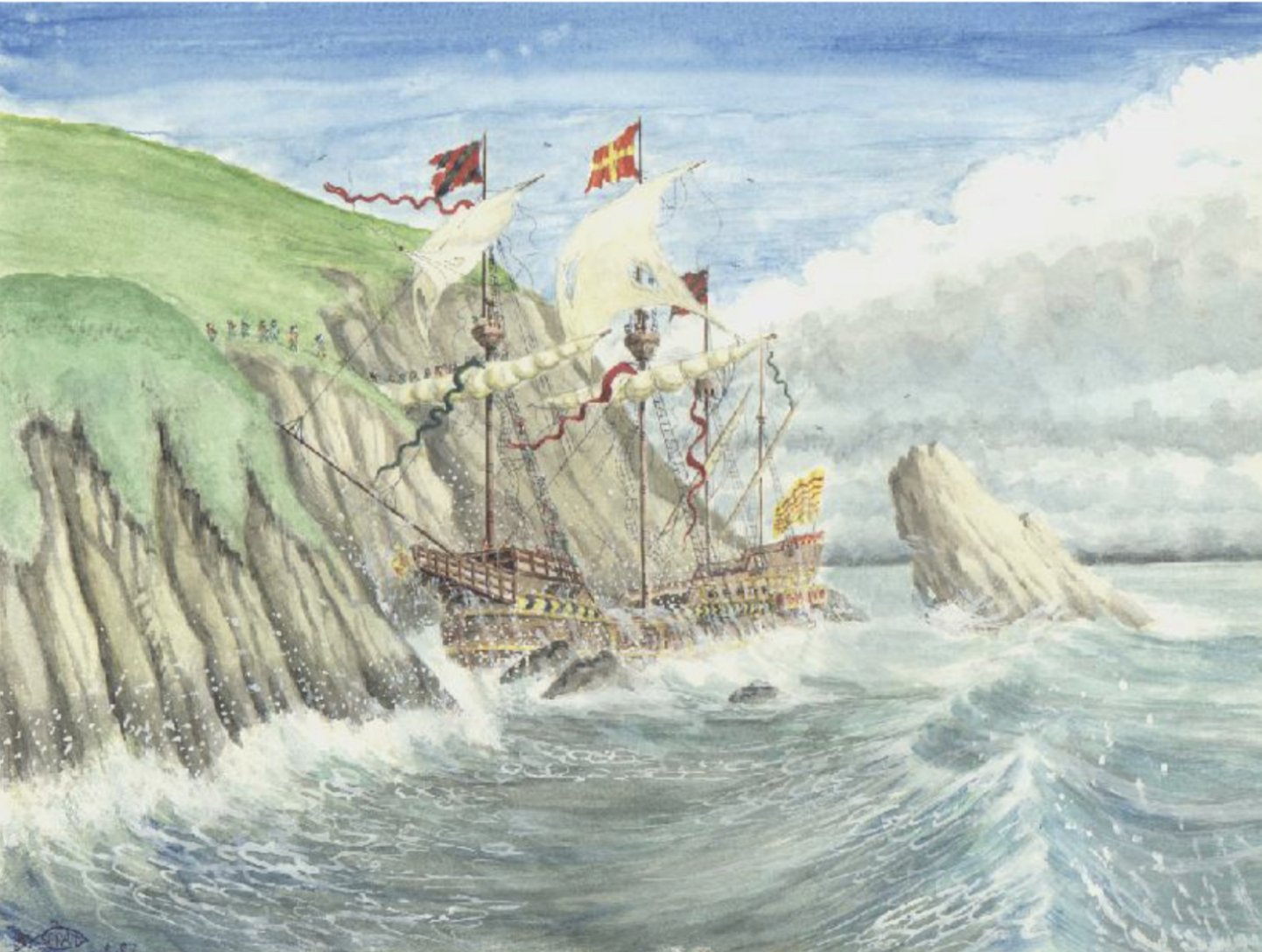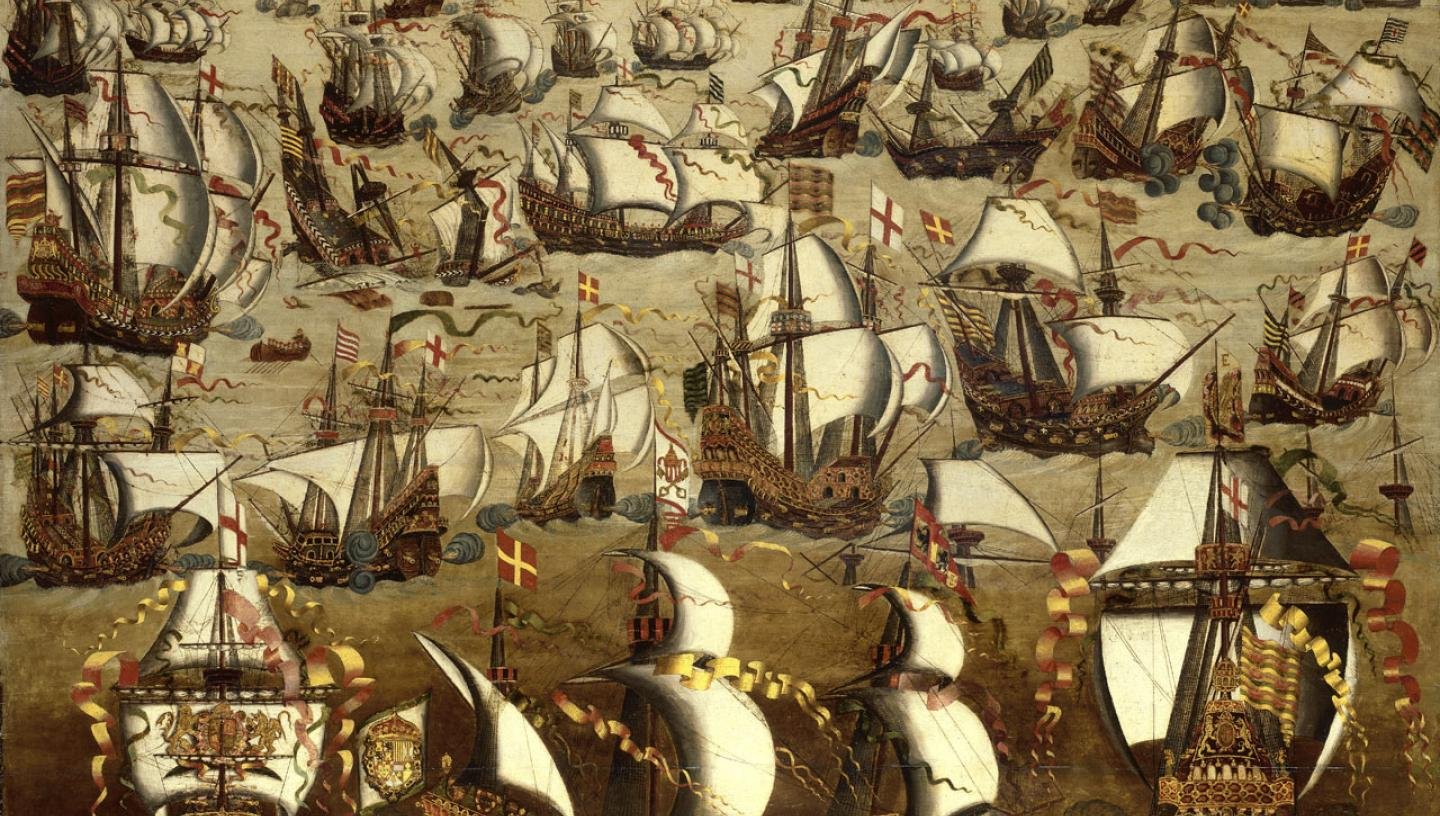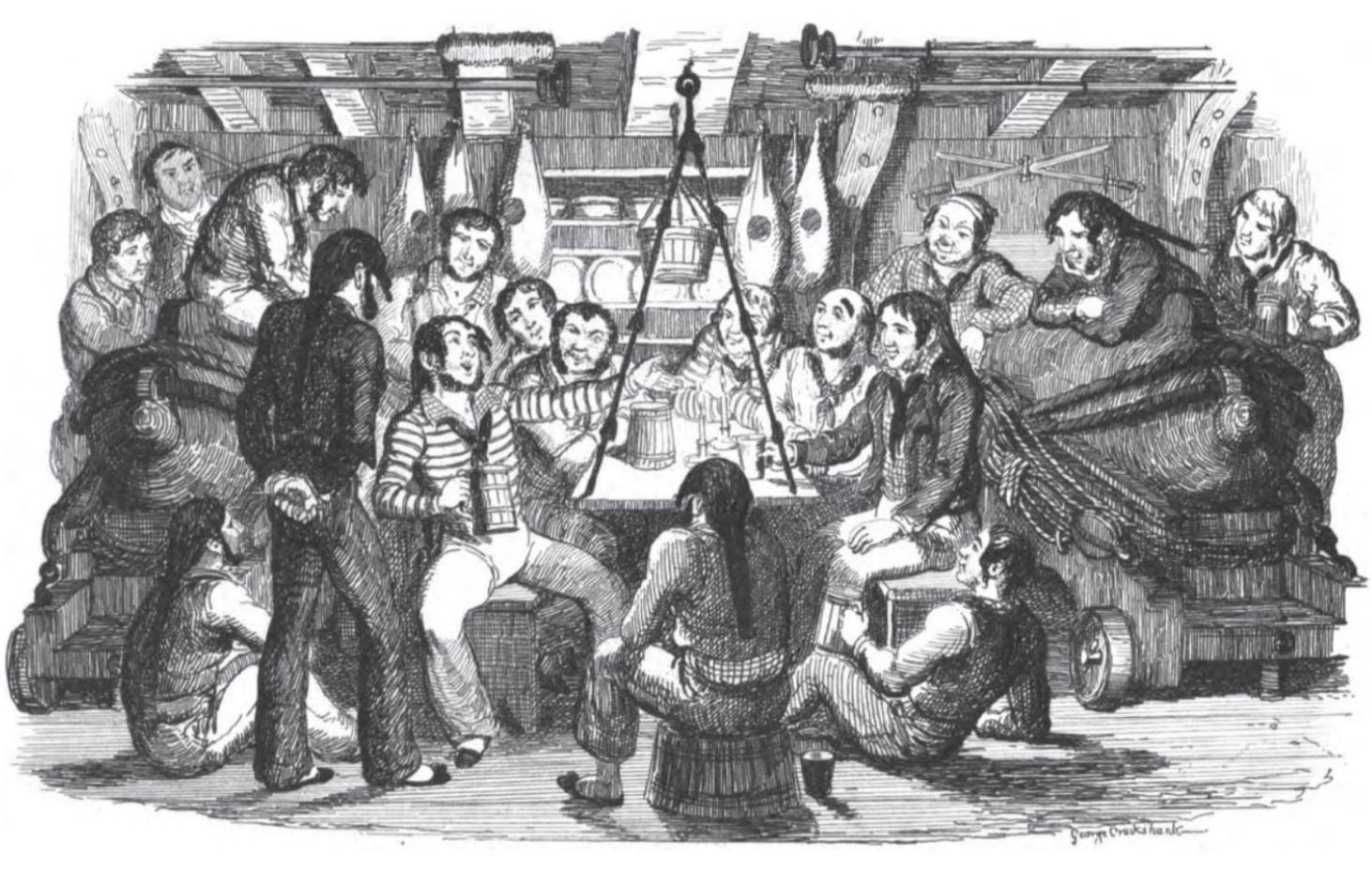The Galleon Girls: A story of the El Gran Grifon
El Gran Grifon wrecked on Fair Isle, Shetland
Welcome back to my blog. This is a real break from my norm. What I'm giving you today – with a certain amount of trepidation – is a childrens' book I wrote when I was on maternity leave a few years ago and it's based on the wreck of the El Gran Grifon. There are very few illustrations (because I'm waiting to have it properly illustrated, and hopefully published) so you'll have to use your imaginations until I can persuade someone to do the pictures. I'm posting here because I would really love your feedback on it. Please feel free to comment below.
Note to Adults:
The following is a little historical background to this tale...
This story, like most of its time, begins with a king. And like most kings of this time, he was obsessed with power and religion. This king, Philip II of Spain, was intent on overthrowing Queen Elizabeth I of England. The Queen, who had once refused to marry King Philip was a Protestant. This was seen as a threat to the Catholic Philip who decided the only way to solve the problem was to invade England.
Now, in order to defeat Queen Elizabeth, King Philip needed more ships. He had a great army which he was proud of, and his ‘Blackbeards’ were good soldiers, but his naval prowess was lacking. So, he and his well-groomed military men commandeered the nation’s merchant ships, including the El Gran Grifón. This 650-ton merchantman was fitted with 38 guns and brought into military service.
Philip II of Spain
Elizabeth I of England
The Galleon Girls of the El Gran Grifón
This is the story of how two hens, after four months at sea, found solace in the most unlikely of places – somewhere in the middle of the North Sea, lying between Shetland and Orkney, in a small byre on the remote island of Fair Isle. The tale unfolded onboard the wide-bellied, clumsy hulk, El Gran Grifón in the year of 1588. El Gran Grifón was a merchantman in the ill-fated Spanish Armada fleet.
Fair Isle from the air. Photo: Ronda Hill
These hens, sisters by birth, could not have been more different. One was mischievous and full-of-fun, and the other, well, she was prim, proper and toffee-nosed – to the point of almost cantankerous! Not your average sea-goers, these girls were often teased and called landlubbers. Nevertheless, small and plump, their beady hen-eyes missed nothing.
A traditional Shetland hen. Photo: Mary Isbister
These two feathered beauties had been taken onboard as Captain Juan Gómez de Medina’s prized layers for he just loved a soft-boiled egg with his morning helping of wine and grog. Now, you might think it unusual to be drinking wine for breakfast? Well, on board this great 16th century ship, it was far safer to drink the wine than dare drink the water which would almost certainly have sent you running for the chamber-pots!
Wine, gin or grog?
When they were taken aboard, Captain Gómez had stowed his ‘ladies’ away in the hold. Tucked up in nest boxes, between crates of musket balls and teetering towers of cannonballs, he spoke to the two perplexed chickens, Carlota and Anna, and waving a bony finger, said, “You two must continue to lay eggs for me as this may be the only fresh food I get on this godforsaken voyage.”
Carlota and Anna looked at each other, eyes blinking in the darkness, gunpowder rising in clouds of dust around them.
“Well, this is an adventure,” Carlota said excitedly, puffing her feathers. Anna, who was prim and sensible scowled at her courageous sister.
“Settle down in your nest box, let’s see what tomorrow brings.” And under a setting Spanish sun, the two hens bedded down for the night, lulled to sleep by the hustle and bustle of sailors loading the ship for departure.
Next morning, Carlota and Anna were awoken with the warm fat hand of the cook, reaching in under their feathers to remove the perfectly formed porcelain-like green eggs which they had dutifully laid for their Captain. Out on deck there was a hush of excitement as the final checks were made and the great ship released the mooring ropes, groaning as she left the quay to join the assembled Armada who lay-in-waiting for the signal to depart.
“Where do you think we’re going?” Carlota asked, her voice filled with anticipation. “I don’t know, but look at all those ships! We’re bound to have a collision if they don’t watch where they’re going,” tutted Anna in response. Carlota rose from her warm bed of straw, and fluttered onto a large bronze cannon gazed out the gun-port, and what a spectacle she saw!
Stretching across the horizon, as far as the eye could see, were the 130 ships which made up the great Armada. With sails billowing in the wind, they appeared majestic and graceful. The ornate carvings and figureheads of architectural wonder took Carlota’s breath away. The gold gilding shimmered in the sun, sending reflections across the bay. It truly was a sight to behold. Carlota stood, spellbound, watching as they left the safety of Lisbon harbour and ventured north towards the English Channel.
“Carlota will you get down!” came the shrill voice of her over-cautious sister. “You’re going to have me egg-bound at this rate! Come away before you fall, you can’t swim. Do you think you’re a duck?”
“Oh stop your fussing and flapping. I’m coming” she said petulantly, as she stumbled in a flurry of feathers down from her cannon-perch. “Let’s explore!” she said, rushing past Anna, gracelessly attempting to make her way up the ladder and on to the deck. Anna hurried after, scorning her sister’s careless attitude and thirst for adventure.
As they made their way along the decks, weaving in and out between sailors’ feet, they spotted their Captain, standing proud on the quarterdeck, gazing over his crew who were busy setting the sails. Carlota, unfazed by the hush of activity around her continued, fluttered onto the deck beside Captain Gómez, where she called for Anna to join her. Unamused, Anna followed her sister, who was now perched on a stanchion watching the fleet as they gathered speed under a favourable wind.
Hearing a door creaking, the sisters turned, to see the chef carrying a silver platter and disappearing into the Captain’s cabin. From the open door, came a great sound of laughter and a plume of acrid tobacco-smoke almost knocked them off their perches. Before Anna had time to stop her, Carlota had disappeared, tail feathers and all, after the chef and into the Captain’s dimly-lit cabin.
Carlota entered, her eyes adjusting as a slither of light cut through the smoke, illuminating the great table. Draped in finery, the officers who ate here enjoyed the best linen, pewter and enough food to satisfy even the greediest among them. A little man, with piggy features, sat, hunched over a great platter, gnawing on a succulent chicken leg. Carlota took one look at this grotesque little man and froze. She turned on her spurs and left as quickly as she had arrived. Anna chastised her, “You know what they say - curiosity killed the chicken!” Carlota, flicking her comb to one side made her way back onto the quarterdeck and into the bright sunshine, ignoring her sister’s warnings.
A few days passed and they familiarised themselves with the ship, the crew, the smells and the constant rolling and pitching of the Grifón as they made their way North. Living conditions for the sailors were grim, the men cramped together below decks, packed like sardines and given only meagre rations to eat. Despite this, morale was good and the two hens enjoyed listening to the men singing and playing dice games on top of barrels of gunpowder and casks of wine.
A few days into the journey the fleet ran into bad weather. This hampered progress and the hens and crew alike, grew miserable. The smell of the sick and dying wafted through the decks, reminding everyone of their own mortality. Fresh supplies were dwindling and they still hadn’t reached England. Those who made up the great Armada simply had to ride out the storm, and wait.
Finally, two months after leaving Lisbon, and after an unscheduled month-long stopover to carry out repairs, the fleet were once again underway. They departed from Corunna and sailed out into the open waters of the Bay of Biscay. But, as they approached the English Channel, the mood on board changed again. The crew became graver, more serious and the singing and games stopped. Carlota appeared oblivious to this as she continued on her single-handed, one-hen crusade to explore every nook, crevice and cranny of the great ship. But Anna didn’t like it. The constant mutterings from the crew, that the English were laying-in-waiting, did nothing to calm her nerves or settle her feathers.
Carlota and Anna awoke one morning to an unfamiliar smell which was coming in through the gun-ports! With beaks sniffing the air, they hurried up on deck to investigate. Peering over the port-side they saw, all along the coast and on every headland, smoke pouring from beacons which had been lit to warn people of the Armada’s imminent arrival. They had reached England. And as the Channel narrowed, the Armada got into formation, a tight crescent-shape, with strong-hulls bearing down on the outnumbered English ships.
And then, the deafening cannon-fire assault began. The English, with their superior guns started the bombardment on the seven-mile-long line of Armada vessels. Carlota and Anna hunkered down below, heads tucked under their wings, deafened by the crashing and banging, wondering what on earth was going on. For days, no hand came to rummage under their feathers to collect their daily eggs, no sailors’ songs were heard, no laughter from the galley. Just the constant boom and the deafening cry of those wounded and dying.
The English were not going to give in easily and the Spaniards retreated to Calais. The English pursued, and this is where the El Gran Grifón took a hit, at Gravelines, that almost certainly sealed her fate. Just when all on board thought they had heard the last cannon fire – BANG –a gun-fire which shook the boat till even her stern-post shuddered. The explosion was felt throughout the ship and the hens heard the cry of “man the bilge-pumps!” echoing down from the deck.
Suddenly, a rush of sailor’s feet went flying past the hens, still hunkering in their nest boxes. The sound of water pouring in could be heard from the deck below. The sailors worked the pumps tirelessly, packing holes with hessian sacks and wooden plugs. Carlota felt her bed of straw turning cold and wet, and to her horror discovered a small hole, from a musket ball in the hull below her. “Anna,” she gasped, “we’re going to sink!” and suddenly, the fearless, brave Carlota, began to panic. Anna, stoic as ever, was quick to act. She flew from her nest, rolling a green egg before her, and plugged the hole, before settling back down.
The English had won the battle at Gravelines. Anna and Carlota only needed to look at the drawn expressions on the sailors’ faces to know this.
The El Gran Grifón,with the remaining Armada, scattered, heading north into the open water of the North Sea – away from the confines of the English Channel where the enemy waited. The two hens listened as the crew discussed plans. It was said that they were going to head north around Scotland, passing the west coast of Ireland, back to Spain. The two hens were relieved at this news, they had endured quite enough of the seven-seas for one lifetime!
Unfortunately, the worst was yet to come. The El Gran Grifón faced storm, after storm, and was forced to sail back and forth between Shetland and the coast of Norway. And now, many hands came to rummage for eggs and with supplies dwindling, these two hens became the most important creatures onboard. Captain Gómez even made them nest boxes in his own cabin, just to ensure the hungry sailors in the decks below didn’t steal the eggs, or worse still, eat his prize hens! Things were becoming desperate. One evening the two hens were awoken by a group of men bursting into the cabin, waking them from sleep they said, “Captain, you must come immediately. The Barca de Amburgo has gone down.
The Trinidad Valencera have taken half the crew but they need assistance!”
“Very well,” replied a groggy Gómez, “Turn her around and go fetch the men. I can’t think how we’re going to feed them though, we haven’t enough to eat as it is.” Carlota and Anna looked at each other nervously, they had heard the crew calling them “chicken broth” already and they hoped to avoid the cook’s cauldron!
With almost 300 men now, the Grifón lumbered along laboriously, still trapped in the North Sea. And three weeks after they rescued the men from the other ship they ran into trouble again off Fair Isle. Whilst trying to make repairs, anchored in Swartz Geo, the cumbersome vessel was driven ashore and wrecked on the rocks at Stroms Hellier. Carlota and Anna watched, dumbstruck, as the desperate men clambered the rigging in order to reach land. The wind whistled through the damaged rigging and the once great ship, lay broken and beat.
Shipwrecked. By Jean Baptiste Pillement
“What on earth do we do now?” Carlota asked nervously.
“Well, we can’t go down with the ship! And the Captain has just left us here, after all we’ve done for that man,” tutted Anna.
“We’re going to have to fly!” Carlota said, her eyes sparkling into life again.
“What have I told you about flying,” Anna scorned “With that clipped wing, you’ll just go in circles!”
“Do you have a better idea?” asked Carlota, as she made her way to the porthole in the stern aftercastle.
The two hens could see the men gathered on the edge of the cliff, gazing down at the broken crang of their wrecked ship, the land beyond, desolate and empty. Anna and Carlota, glancing at each other, plucked up the courage and flew onto the cliff to join the others.
And as they took to the sky – flight for the very first time – they gazed at the world beneath their wings. A world of chaos and anger, of suffering and plight. The crashing waves below, tearing at the cliffs, removing great chunks of earth – earth which had been there for millenia. The churning seas, foaming and angry, ripping great chunks from the once strong and proud ship they had called home. The island, a storm-blasted, barren landscape, a few small houses tucked into the hillsides, braced against the prevailing wind.
The men, anxious and disoriented took no notice of the two hens who had landed and were picking at their feet, happy to be on terra firma once more.
A traditional Shetland "galleon hen". Photo: Mary Isbister
And this, according to folk legends, is said to be how the ‘Galleon Hen’, with her distinctive ‘tappit’ head and porcelain-like green eggs, came to be in Shetland.
The End.
I really hope you enjoyed my tale...
Please send me your feedback,
With love,
















